By Eric Vandenbroeck
and co-workers
The Anti-Jewish Dimension Of Russia
The relationship
between church and state was symbiotic: being upheld by the secular authority,
the spiritual one supported the former and its policy. In a word, as the
Emperor's will was justified by religion, a real secularisation of
state power was excluded. The inherent conservatism of the Orthodox Church made
it perceive church tradition, not the Gospels, as the ultimate authority. Even
in our days, this traditionalist thinking sometimes manifests itself within the
Russian Orthodox Church and the rhetoric of some national patriot thinkers. In
the nineteenth century, ideas were continuously exchanged between Slavophilism
and German nationalism. The influence of German idealistic romanticism on
original Slavophilism, in general, has already been mentioned. More
specifically, Johann Gottfried Herder's philosophy of history inspired the
Slavophiles to emphasize the organic character of development and society.
Yet, the Russian idea was not a copy of German national thought ('Teutonophilism') as Orthodoxy colored it and, consequently,
still represented traditionalism. The degeneration of the Russian idea towards
advocating imperial chauvinism and Panslavism, and
outright anti-Semitism during the last three decades of the nineteenth century,
had its approximate nationalist parallel in Germany.
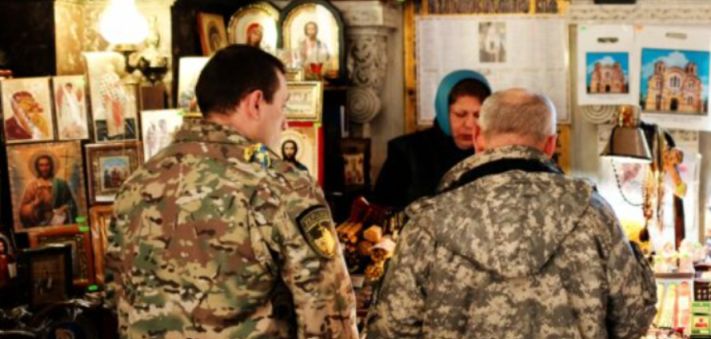
The anti-Jewish
dimension of the Russian idea had already become a vital issue in Russian
domestic politics by the 1880s. However, this phenomenon differed from the
traditional confessional anti-Semitism cultivated from time immemorial by the
Russian Orthodox Church. The new kind of anti-Semitism had come from
crisis-stricken Germany, where it served as a backlash movement against the
accomplished political and economic Emancipation of the Jews. Among the modern
German anti-Semites, the radicals represented racial biology, and the moderates
wanted to oust the Jews from public service (ibid.). The latter category became
predominant among Russian rightists after the revolutions in 1917 when the
Russian Jews got access to government offices.
In the 1920s and
1930s, Nikolai Danilevsky's geopolitical
ideas were paralleled and surpassed by the German national socialists'
geopolitical projects. The semi-fascist Russian extreme right is often called
the `Black Hundred' (chernosotentsy). The name refers
to the paramilitary groups that belonged to the Union of Russian People (Soiuz Russkogo Naroda).
This most crucial rightist party had emerged before the first Duma elections in
1906. The new message of the Black Hundred was that the real confrontation of
the contemporary world was `Russia versus Jewry.' The idea of a Jewish
conspiracy against Russia was gaining ground among Russian nationalists mainly
due to the appearance of the notorious Protocols of the Elders of Zion (Protokoly Sionskikh Mudretsov), an infamous forgery attributed to the tsarist secret service, the 'Okhranka.'
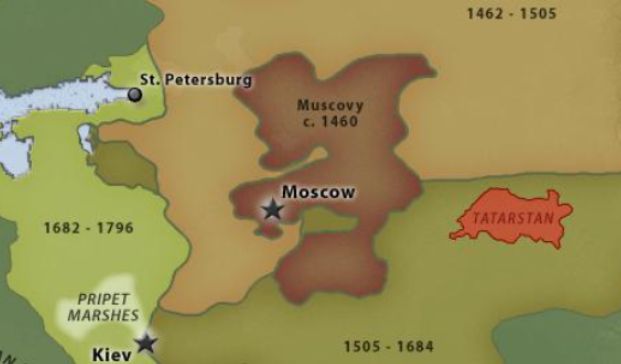
One of Russia’s most
influential Jews was quoted in Russian media supporting President Vladimir
Putin's claims of his "military operation bringing about the ‘Denazification’ of Ukraine.
In recent years,
there has been a systematic glorification of Nazi criminals, torchlight
marches, and the like, said Rabbi Alexander Boroda,
who serves as chairman of the Board of the Federation of Jewish Communities of
Russia (FJCR). He spoke to the Russian news agency Interfax on March 4. During
the interview, he expressed “bewilderment that neo-Nazism was actively
asserting itself in a country like Ukraine.
“The participation of
the UPA (The Ukrainian Insurgent Army) in punitive actions concerned not only
Jews but also other ethnic minorities," Boroda
said, giving, "for example, the Volyn massacre, which destroyed fifty
thousand Polish civilians.”
People walk near a
banner depicting Russian President Vladimir Putin as Adolf Hitler, in Poznan, Poland, on
16 March 2022.
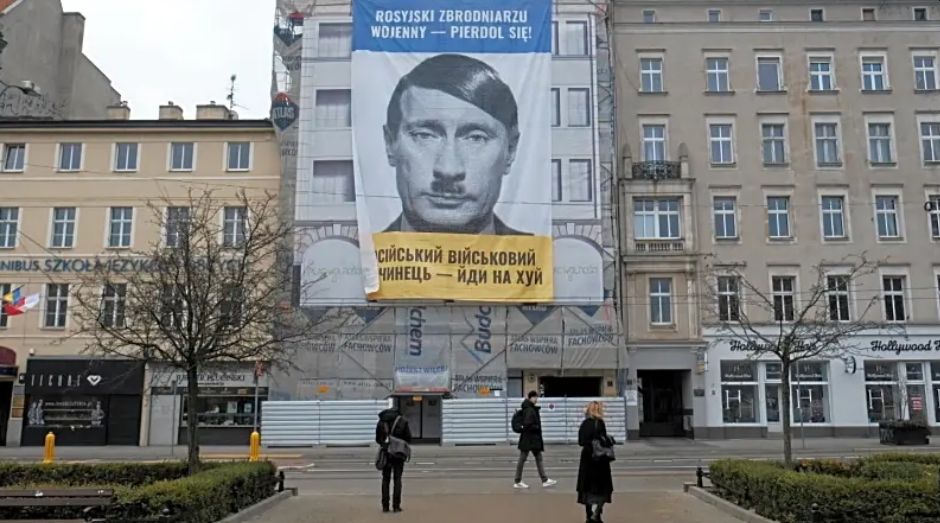
Given the above
context, it is also interesting to see how the Russian Orthodox Church has played
an essential part in the Kremlin’s war on Ukraine, according to the following
testimony:
I arrived in Soviet
Russia in 1989, as perestroika and glasnost were in full swing, to help rebuild
the Jewish community destroyed by 70 years of Communist rule.
One winter day in
2003, the Federal Security Service (FSB) official assigned to the Moscow Choral
Synagogue, a man I’ll call Oleg (his name has been changed purposely)—invited
me to a police station at 40 Sadovnichevskaya Street.
Oleg and his colleague started saying that I, a Swiss citizen, had been using a
business multiple entry visa to stay in Russia, which is illegal since I was a
religious worker; however, they were ready to overlook this issue if I started
reporting to them. They pressed me to sign something, yet I refused
categorically, saying that it was against Jewish law to inform others.
After badgering me
for over an hour, they finally let me go. I was shaken to the core of my being.
Oleg came back twice to try to convince me. Once, he even stopped my car in the
street — from that moment on, I understood that the driver might also be
working for the FSB. Two years later, in 2005, I was expelled from
Russia—possibly related to my refusal to cooperate with the intelligence
agencies. I was eventually able to return only after the intervention of
then-Prime Minister of Italy Silvio Berlusconi.
Years later, I know of
multiple attempts to recruit my colleagues in the Jewish community. In
addition, FSB operatives regularly monitored, visited, and intimidated heads of
religious organizations, ensuring everyone was aware of their presence. Some
Jewish student leaders were invited to the offices of the FSB on Lubyanka
Square.
Perhaps most notably,
in 2000, the Kremlin allied with the Federation of Jewish Communities of Russia
(FEOR)—a partnership that served several purposes. First, it was an alibi for
Putin not being an antisemite as he destroyed the oligarchs, many of whom were
of Jewish descent (Mikhail Fridman, Vladimir Gusinsky, Mikhail Khodorkovsky, Boris Berezovsky)—as a
class.
The second task of
FEOR was for the Western world: As Putin became more authoritarian and Western
powers became apprehensive, the heads of FEOR were dispatched to the West to
convey one message: As wrong as Putin is, any alternative would be worse, and
Jews would be persecuted. As protests grew in Moscow after Putin announced his
return to power in 2012, FEOR rabbis quickly demanded that their Moscow
congregants desist and not take part in the demonstrations, upholding the
general government effort of depoliticizing civil society.
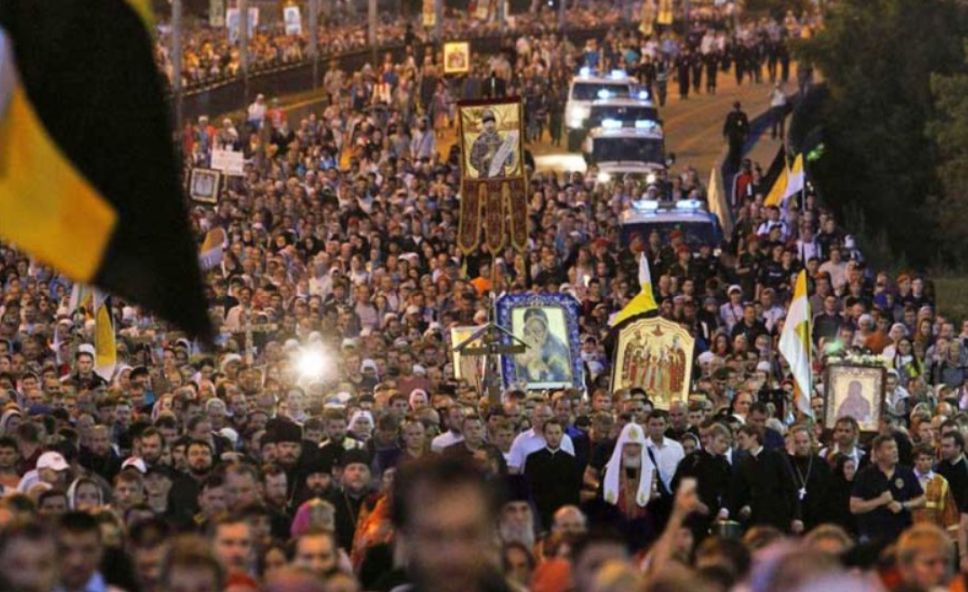
Later, as Russia
conquered Crimea, FEOR leaders were at the forefront of pushing the line on
social media as protests erupted from Russian Jews: Jews, don’t get
involved; this is not our fight.
Within the context of
the Russian propaganda narrative of fighting neo-Nazis in Ukraine, the Museum
of Tolerance, built by FEOR and centering on the history of World War II, was
used again and again to push the line that the war against Ukraine was a
war against the resurgence of Nazism. This line was used by Rabbi Alexander Boroda,
the president of FEOR, to support the war. FEOR’s sister organizations outside
of Russia, such as Chabad, barely said a word.
Even though the
Kremlin partly succeeded in controlling and instrumentalizing the Jewish
community of Russia, the FSB continued with its war of attrition against the
rabbis, mainly of foreign origin, exiling more than 11 communal rabbis during
the last decade—namely, those who did not follow the party line established by
the FSB and modeled by the Russian Orthodox Church.
Indeed, the Russian
Orthodox Church has played an essential part in the Kremlin’s war on Ukraine.
As the world marks the first anniversary of the Russian invasion, we must
examine how religion has been weaponized—and perverted—to justify crimes
against humanity.
Kirill's support for
the war in Ukraine has deepened a
rift between the
Russian branch of the Orthodox Church and other wings of Orthodoxy worldwide. Pope
Francis, head of the Catholic Church, has been a vocal opponent of the war and
has appeared to scold Kirill's position in several public addresses, including
earlier this month when he said God does not support the war.
The head of the
Russian Orthodox Church has said that Russian soldiers who died in the war
against Ukraine will be cleansed of all their sins, days after President
Vladimir Putin ordered the country's first mobilization since World War Two.
Patriarch Kirill is a
key Putin ally and backer of the invasion. He has previously criticized those
who oppose the war and called on Russians to rally around the Kremlin.
Russia’s invasion of
Ukraine in 2022 left all the constituent entities in the complex structure of
the ROC facing a dilemma: speak out against Patriarch Kirill for his support of
the war, or remain loyal to the church leadership and risk becoming seen as
Kremlin agents in their own countries, with all the ensuing legal and
reputational ramifications. As far as it is known, the Moscow Patriarchate has
not offered any recommendations to its churches.
Under church law,
these constituent churches cannot independently separate from the ROC: they
would be considered schismatics. Theoretically, they can arrange to be
recognized by the Ecumenical Patriarch of Constantinople, the “first among
equals” of the Eastern Orthodox Church.
Also, the Ukrainian
Orthodox Church (Moscow Patriarchate) has long retained an important
presence in Ukraine, making up one-third of all the parishes of the
Russian Orthodox Church. The Ukrainian Orthodox Church (ROC) is
the ‘Moscow Patriarchate’ tag, arguing it is based in Ukraine. But it has long
resisted pressure from the Ukraine side to adopt autocephaly, most notably at
the same Sobor (bishops’ council) of the Russian Orthodox Church in 2000 that canonized Nicholas II and his family.
Any new structure is
unlikely to have many congregation members right away: in other former Soviet
countries where parallel jurisdictions are in place, the ROC generally retains
most worshippers. Churchgoers fear becoming schismatics and losing grace
(standard ROC propaganda) and don’t believe themselves capable of making
decisions on their religious affiliation. But the existence of an alternative
and competition changes the situation, especially when the state organs are
also interested.
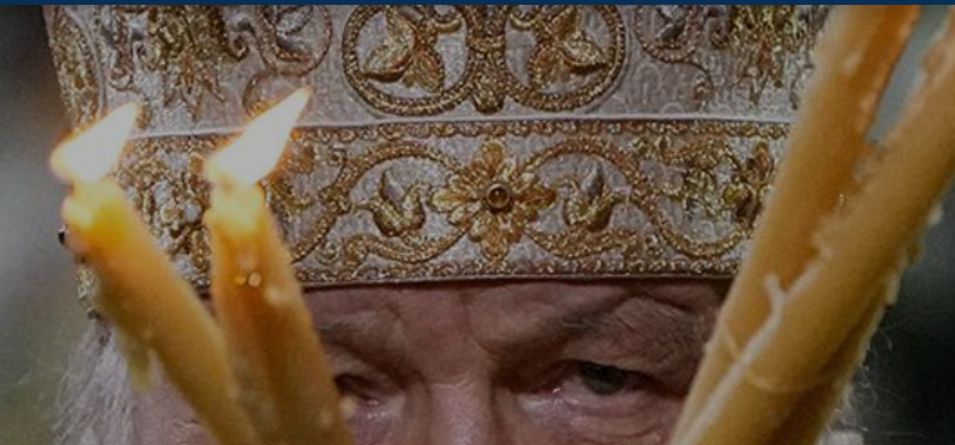
As seen
above, Patriarch Kirill of Moscow identifies entirely with the Russian
regime and Putin’s political elite. He cannot envisage a future for the ROC
that does not reach the outer borders of the Soviet Union. He has supported the
war for almost a year, demonstratively appearing at Kremlin events, blessing
murder, and justifying aggression. He isn’t thinking about the situation he is
creating for all the other Orthodox constituent entities of the ROC outside of
Russia’s jurisdiction: the bishops, priests, and millions of congregation
members, including victims of the war.
On 29 December, the
ROC Synod indefinitely postponed the next meeting of the Council of the
Primates. That meeting is impossible: neither the Ukrainian nor European
primates will attend, meaning there will not be a quorum. In its current state,
the ROC is becoming ungovernable and can only be preserved if Russia conquers
all those countries by force. This is why the ROC’s support for the war is only
getting stronger, to the detriment of its constituent parts in other countries.
These centrifugal
processes may eventually halt, after which some kind of new Orthodoxy in the
Russian tradition will emerge: without the ROC and Putin. First, it remains to
be seen how the Patriarch will solve the unavoidable issues, such as the status
of the Lithuanian Church and autocephaly for the Latvian and Ukrainian
churches, and whether, by that time, his decisions will even carry any weight.
And in the
end, Russia’s war in Ukraine has touched every
part of the world. The consequences will be felt for years, if not decades,
to come.
Born to a Ukrainian
Jewish family, the President of Ukraine grew up as a native Russian speaker in
Kryvyi Rih, a major city of Dnipropetrovsk Oblast in central Ukraine. He
obtained a degree in law from the Kyiv National Economic University.
For updates click hompage here